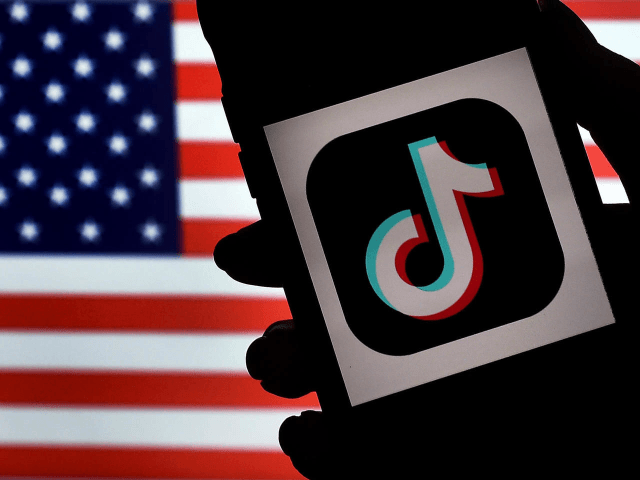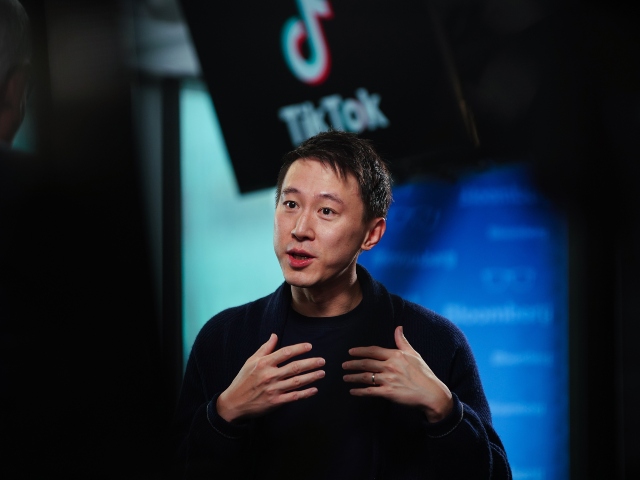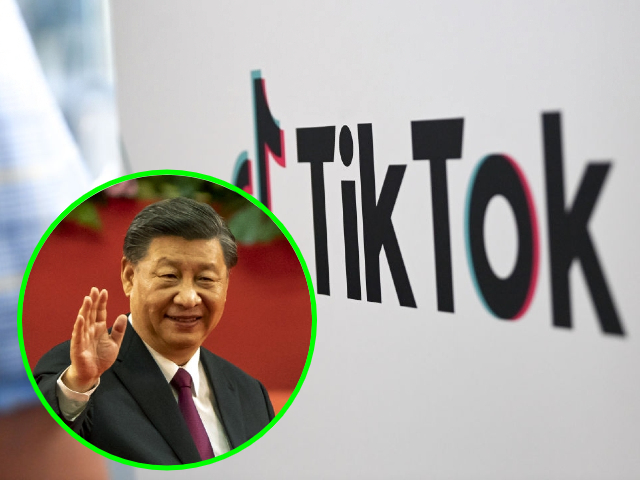China-owned TikTok is Chinese surveillance and psyops thinly veiled as a social media platform that FCC Brendan Carr has labeled “China’s digital fentanyl.” It is time for lawmakers to stop ignoring the giant panda in the room and ban the platform from this country before China can do even more damage to America’s youth — and its elections.
TikTok should be banned in the United States. When one looks at the total picture of the damage done in this country by the hyper-popular platform, owned by China’s ByteDance, the question shifts slightly—why wasn’t the platform banned when President Donald Trump proposed the move? The dangers to America’s youth, security, and elections are so great that to not act that this juncture is bordering on national suicide.
The problems TikTok presents can be broken into three broad categories — the danger to teens, the national security threat, and election meddling.
The Danger for Kids and Teens
China is a hostile foreign country that is using TikTok to get U.S. teens to participate in trends that are dangerous and life-threatening.
In September, the FDA warned parents of a deadly new TikTok challenge that involves children cooking chicken in NyQuil, “presumably to eat.” The trend on the China-owned app was just the latest example of a dangerous stunt spread to young Americans.
Another challenge seen on TikTok in 2020 involved urging users to take large doses of the allergy medication Benadryl (diphenhydramine) to induce hallucinations. The challenge resulted in reports of teens being rushed to the hospital, and in some cases, dying.
Last year, school officials spoke out against TikTok’s “bathroom challenge,” which encouraged students to vandalize school restrooms. The challenge, also known as “devious licks,” involved videos depicting vandalism of trophy cases, hallways, and classrooms, as well as theft of fire extinguishers, school signs, and other property.
To add insult to injury, the Chinese app also rewards U.S. users by making them go viral or become “TikTok famous” for behaving foolishly. On one hand, this is accomplished by posting frivolous dance videos, but on the other, it is for popularizing dangerous trends or posting sexual content.
TikTok’s algorithm also makes it easier for teenagers to go viral and gain internet fame when they post sexualized videos. This has also taken a toll on teens’ mental health, according to mental health professionals. And the Chinese company seemingly tailors its algorithms to have different impacts on various communities. For example, a lawsuit filed in July alleges that TikTok pushes especially violent content on black teenagers.
Unlike other social media platforms — such as Facebook, Instagram, YouTube, and Twitter — TikTok makes it much easier and faster for teens to obtain what they perceive as “fame” on the app. This fame can come with a terrible price.
The National Security Threat
TikTok is owned by the Chinese company ByteDance, which — under China’s laws — can be forced to hand over the data TikTok has collected on U.S. citizens to the Chinese Communist Party. And TikTok collects a plethora of data on American citizens.
In October, it was reported that ByteDance planned to use TikTok to monitor the physical location of specific American citizens. Then in November, TikTok admitted that its employees in China can access the private data of accounts based in other countries.
Currently, TikTok is hoping to sign an accord with the Treasury Department’s Committee on Foreign Investment in the United States (CFIUS), which assesses national security risks presented by foreign companies.
But security experts say TikTok users would still risk having their personal data exposed to hacking and espionage by China, even if the U.S. government were to set up a security agreement designed to keep the app from being banned.
Meanwhile, FCC Commissioner Brendan Carr is calling for the government to ban TikTok, as well as for Google and Apple to ban it from their app stores (a request that shouldn’t be too daunting, given that the tech giants have banned American companies for far less).
Last week, Carr declared that “TikTok is China’s digital fentanyl,” and banning it “is a basic IQ test for the administration.” The FCC Commissioner also noted that China shows a “very, very different” version of the app in China than it does in the U.S.
Carr explained that people view TikTok as “just a fun application for sharing dance videos or other funny videos, but that’s just the sheep’s clothing,” but it actually “operates as a very sophisticated surveillance app,” and pulls “everything from everything from search and browsing history, potentially keystroke patterns, biometrics, including faceprints and voiceprints.”
Even Democrats agree, as Sen. Mark Warner (D-VA) recently proclaimed, “This is not something you would normally hear me say, but Donald Trump was right on TikTok years ago.” TikTok has been under scrutiny by U.S. officials since 2019, under the Trump administration.
On Tuesday, FBI Director Christopher Wray echoed these sentiments, telling Congress he is “extremely concerned” about TikTok, and warned lawmakers that allowing the Chinese app to continue operating in the United States could be a national security threat.
While U.S. leadership has yet to act with regard to risks posed by TikTok when it comes to U.S. civilians, it is obvious that they know better, given that government agencies — such as the U.S. military and TSA — have already banned employees from having the app on their devices.
This begs the question: if TikTok isn’t safe for U.S. soldiers, then why would it be considered safe for civilians?
Meddling in U.S. elections
As Dilbert cartoonist Scott Adams recently pointed out, a big factor in Democrats’ strong performance in the midterm elections was TikTok. “The group of Americans that controlled the election outcome are the group of Americans that China controls through TikTok,” Adams said.
“Allowing TikTok, a Chinese company — to be the primary channel for the most important group of voters in the United States. Do you see any problem there?” the pundit asked.
One exit poll found that a staggering 68 percent of unmarried women favored Democrats in the House midterm elections, a demographic that is extremely powerful on TikTok, as nearly 60 percent of who those use the Chinese app are female.
As an example of TikTok’s power, consider that after a draft Supreme Court opinion overruling Roe v. Wade was leaked in May, pro-abortion activists reportedly took to TikTok, where they posted videos of themselves dancing in an attempt to “save Roe v. Wade through the awareness-spreading power of dance.”
While the dance videos on TikTok didn’t influence the U.S. Supreme Court’s decision to ultimately overrule Roe v. Wade, and were widely mocked by conservatives at the time, it did appear to influence U.S. elections — as they served as another means of spreading pro-abortion rhetoric ahead of the midterms.
“We acknowledge that TikTok dances may not have been the greatest tactic to get the SCOTUS draft rejected, but please understand that this was part of a greater awareness campaign,” a page promoting the pro-abortion TikTok dances read following the overruling of Roe.
Some might argue that U.S. social media companies are also corrupt, harmful to teens, and meddle in U.S. elections. Yes, but U.S. companies can be held responsible under the laws of our country, whether that takes the form of action by Congress or regulators, whereas the same is not possible with TikTok. Can any reasonable person argue that a Chinese company operating in the good graces of the country’s Communist regime would have any qualms about lying when Americans question its operations? As a reminder, we’re talking about a company that happily devised a plan to collect the “faceprint” and “voiceprint” of millions of American teens.
In fact, saying that TikTok shouldn’t be treated differently from a U.S. company is like saying that crimes committed by illegal aliens shouldn’t be treated any differently from crimes committed by U.S. citizens.
When an illegal alien commits a murder in the United States, for example, left-wing activists and media oftentimes change the subject to U.S. citizens and argue that “American citizens break the law too” or, a favorite refrain: “illegal immigrants commit crimes at lower rates.”
In both the case of crimes committed by illegals and China destroying American teens and throwing U.S. elections, these negative impacts on society are completely preventable. All crimes committed by illegal aliens are completely preventable — if the U.S. were to simply secure its own border and enforce its own laws, that is. The same logic applies to TikTok.
Like illegal immigration, all problems derived from TikTok are completely avoidable — if our leaders stop enabling China and shut down the Communist regime’s favorite propaganda platform immediately.
You can follow Alana Mastrangelo on Facebook and Twitter at @ARmastrangelo, and on Instagram.



COMMENTS
Please let us know if you're having issues with commenting.